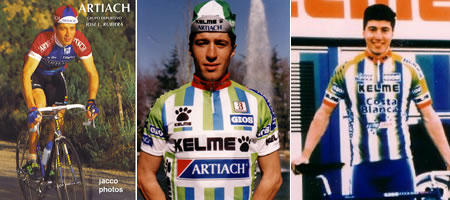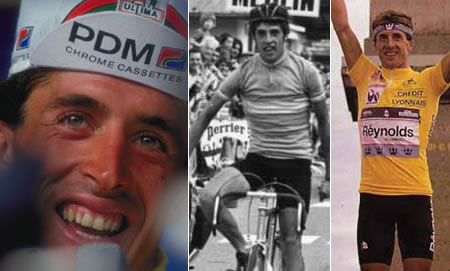www.chechurubiera.info - an online magazine for fans of Chechu Rubiera

 VUELTA A ESPAÑA
VUELTA A ESPAÑA
Introduction
CHECHU RUBIERA
Rubiera Retro : Fan Diary from Asturias : Ciclismo Fondo in Asturias with Chechu : Dad In Support
VUELTA RETRO
1936 : Julián Berrendero : Luis Ocaña : José Manuel Fuente : Pedro Delgado
SPAIN
Vigo : The Way of St James : Covadonga : Prince of Asturias Award : Mountain Facts : Exploring the Alhambra : The Pass of the Moor's Sigh
PEOPLE
Famous Galicians : Prince of Asturias : Catherine of Aragon : Federico García Lorca
CULTURE
Bull Run : Siesta : Interiors - Jaime Hayon, Nani Marquina : Saving El Burro : Spanish Nicknames
FOOD
5 To Try : Atlantic Spain : Fabada Asturiana : Growing Fabada Beans : About Olives
BOOKS
¡Guerra!
VUELTA A ESPAÑA
CHECHU RETURNS FOR NUMBER 7

2007 VUELTA A ESPAÑA
1 to 23 SEPTEMBER 2007
The Vuelta a España is a journey. An extraordinary journey, dramatic, inspired and heroic.
Each year, the Vuelta peloton travels through the startling landscape of Spain. From the misty green hills and awesome mountains of the Costa Verde, through the vast expanse of the meseta and sierra to the endless, sun-drenched Mediterranean coast.

los Lagos de Covadonga
This journey has also been made through 70 years of Spanish tumultuous history.
First run in 1935, the Vuelta has survived a brutal civil war, four decades of dictatorship, economic and diplomatic isolation, unimaginable hardship and fear.
The names of Vuelta's past resonate endurance and toil. Spanish heroes like Berrendero, Bahamontes, Ocaña, Fuente, Delgado, Induráin, even disgraced Heras, have all experienced the glory of winning and pain defeat.
On the final podium in Madrid, they've been joined by outsiders, Merckx, Hinault, Poulidor, Anquetil, Gimondi, Rominger and Zülle, cycling legends who have challenged and beaten the Spaniards on home ground.

See RACE WEBSITE
DISCOVERY'S TEAM
Discovery Channel's nine-man team has been listed for the Vuelta.
Janez Brajkovic, Tom Danielson, Allan Davis, Stijn Devolder (leader), Egoi Martinez, Jason McCartney, Sergio Paulinho, Chechu Rubiera and Jurgen Van Goolen.
EN ASTURIAS CON RUBIERA
CICLISMO FONDO DIGS DEEP
Within cycling, what word defines you best : Gregario
Your first victory : In Llanes when I was 14
And the one you like best : The stage victory in the 1997 Giro
Your worst day : In the Tourmalet during the 2006 Tour de France
Your best day on the bike : The Ordino Arcalis stage in 2000
The best summit for attacking : I like steep ones like Luz Ardiden
Your idol : Miguel Indurain
The best place for training : Asturias
The best downhill rider, Samuel or you? : Samuel and also Savoldelli
The best team mate : Beltran, Javi Pascual, Noval
The rival who made you suffer most : O’Grady in a breakaway that we shared in the International Criterium. In the end, I had to let go
In your jersey pockets :Rice cakes
And apart from cycling, a fault : Disorganised
A quality : Let others tell
A hobby : Any sport in the open air
The kind of music you listen to : All types. From AC/DC to classical music
The book on your bedside table : The Pillars of the Earth by Ken Follett
Your favourite film : Princess Bridebr>
Your favourite dish : Fabada
Your favourite drink : Cider
Your favourite holiday place : Menorca
Something you never forget to pack in the suitcase : Music
If you were not a cyclist : Engineer
VUELTA RETRO
JULIÁN BERRENDERO
 See FAN SITE
See FAN SITE
RUBIERA FANS
DAD IN SUPPORT
 La Nueva España reports that Chechu's father, also José Luis Rubiera, was on roadside during stage 19.
La Nueva España reports that Chechu's father, also José Luis Rubiera, was on roadside during stage 19.
On long climb to the Lagos de Covadonga, he was spotted wearing a shirt with Chechu's name and a big #1 on it.
He told LNE that Chechu was still recovering from the trip to China in July.
VUELTA RETRO
1936 : SPANIARDS UNITE

from Viva la Vuelta : the story of Spain's great bike race by Lucy Fallon and Adrian Bell
1936 and the Spanish defend second place. "It was a conservative strategy in which all the leading Spanish riders colluded ... they'd agreed to form a coalition against the foreigners, with Mariano Cañardo, their most experienced and respected rider, as effeictve team leader. Denied any chance himself of a top position overall, Cañardo had instructed them all to ride in defence of Escuriet's second place.
"Through Asturias and into Galicia, the race descended into a slow, boring routine: natural climbers like Fermín Trueba and the young up-and-coming talent Julián Berrendero had to contain their frustration.
"The organisers became increasingly impatient, as did the one remaining Basque rider in the race, Francisco Goenaga, who took off on his own on stage 16. Cañardo, who had the arms of a stevedore, immediately chased him down and thumped him, ordering him to get back into the peloton. Goenaga complained to the officials, who did nothing, so he went off again. And again Cañardo caught him and this time hauled him back by his shorts."
See AMAZON
RUBIERA FANS
FAN DIARY

We're grateful to Bruno Lopez, who has sent us our first pictures of Chechu at this year's Vuelta.
Bruno spoke with Chechu in Langreo at the start of Stage 4.
I had a little chat with him, I told him to attack and try to win a stage in this edition of La Vuelta, he told me it was difficult. He seem pretty happy, but he's always happy. I talked with him and with the other team-mates, Egoi, Allan and so on. Egoi Martinez told me he will try to catch the break of the day, but today wasn't a good one for him.
Bruno spotted Benjamín Noval, watching from the roadside. Apparently, he did the climb earlier for training, and then he stood to cheer on his team-mates.
Chechu was surrounded by home fans asking for photos, and just let him know that we love him here in Asturias.
The photo of young Bruno and young Chechu was taken in 1995, when Bruno was just ten and Chechu was a shiny 22-year old, riding with his first team, Artiach.
VUELTA RETRO
LUIS OCAÑA
Luis Ocaña was born in Cuenca, central Spain on June 9, 1945. In 1957, his family emigrated to France, looking for a new life and better conditions for their sickly son.
The early 1970s was one of Spanish cycling’s most exciting periods when two stars emerged almost simultaneously: Luis Ocaña and Asturian, José Manuel Fuente.
King of the Mountains and second overall in 1969, Ocaña won the Vuelta a España in 1970. Everything was decided in the final time trial on the final day, after more than 3,000km of cycling.

Spanish newspaper Dicen declared Ocaña “the best time-trialist that Spanish cycling has ever had, and the best cyclist of the moment”.
Ocaña, who always had a profound sense of his Spanish identity despite living in France, declared, “Today, I feel more Spanish than ever”.
At the Tour de France in 1971, Ocaña was Eddie Merckx’s main challenger, he defeated Merckx in the Alps. “It had been exciting beyond words to see the invincible Belgian brought to his knees, at least for a few days” when a devastating crash on the descent of the Col de Menté in a torrential storm left Ocaña with a severe head injury. Merckx continued to the finish line, to the jeers of the Spanish fans.
The battle continued in 1972, until Ocaña withdrew with bronchitis and heart problems. In 1973, Ocaña won six stages and the maillot jaune over Bernard Thévenet, and became the first Spaniard to have won the Tour and the Vuelta.
Luis Ocaña retired to his vineyard estate in 1977. In later years, he suffered from depression. He died on May 19, 1994, age 49, he committed suicide at his family home, Mont-de-Marsan.
Between 1968 and 1977, Luis Ocaña rode to over 100 victories including, the Tour de France 1973 (winning six stages); Vuelta a España 1970; Critérium du Dauphiné Libéré 1970, 1972, 1973 ; GP du Midi Libre 1969; Semana Catalunya 1969, 1973; Volta a Catalunya 1971; Vuelta Ciclista a Pais Basque 1973. He was champion of Spain in 1968, 1972, won the GP des Nations 1971, and was third in the World Championships in 1973.
Luis Ocaña’s autobiography, Pour un Maillot Jaune (French) was published in 1972.
RUBIERA RETRO


HABLAR
You don't want a reputation as a chuparruedas.
In Spanish, it means "wheel sucker", a cyclist who sits on the wheel of others and takes advantage of their hard work.
VUELTA RETRO
JOSÉ MANUEL FUENTE
Like Luis Ocaña, José Manuel Fuente was an extraordinary cyclist. A prodigious climber, Fuente was also an all-rounder, a pure cyclist.
In the early 1970s, epic duels between Ocaña and Fuente were played out on the roads of Spain. In 1974, with Fuente wearing yellow, their intense rivalry on penultimate stage caused Fuente and Ocaña to crash, as their handlebars locked. Fuente was left bleeding copiously. The next day, he finished the final time trial in agony, sweating, forcing every pedal stroke ... but he had won the Vuelta by eleven seconds.
 José Manuel Fuente was born in 1945, and grew up in Limanes, Asturias. His childhood was tough. When Fuente first rented a bicycle to take part in races, he was looking for a way out of poverty. "I never had a real childhood, nor a real youth". He was a self-taught cyclist, he never tired of trying to escape.
José Manuel Fuente was born in 1945, and grew up in Limanes, Asturias. His childhood was tough. When Fuente first rented a bicycle to take part in races, he was looking for a way out of poverty. "I never had a real childhood, nor a real youth". He was a self-taught cyclist, he never tired of trying to escape.
His nickname was "el Tarangu", which in Asturian means "unconcerned with himself". His descending was fearless, even reckless. His natural instinct was to attack, even when it made no tactical sense.
José Manuel Fuente won the Vuelta overall in 1972, as well as King of the Mountains, and again 1974. He wore pink in the Giro d'Italia, finishing 2nd to Eddy Merckx in 1972 and 3rd in the 1973 Tour de France. He won the Tour de Suisse in 1973.
After retiring in 1975 due to ill-health, Fuente opened a cycle business in Oviedo. He struggled with his kidney disease and underwent a kidney transplant in May 1996. Sadly, a few weeks later, he died in Oviedo, aged 50.
In September 1995, the Vuelta organisers named the climb over the Naranco, "Cima José Manuel Fuente".
VUELTA RETRO
PEDRO DELGADO

See OFFICIAL WEBSITE